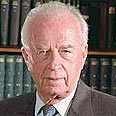
PM: Bridging our gaps will aid peace
Knesset holds special session marking 15th anniversary of PM Yitzhak Rabin's murder. Netanyahu says has better understanding of what Rabin was trying to achieve, stresses 'the violence that ended Rabin's life has no place among us'
The Knesset held a special session Wednesday, marking the 15th anniversary of the assassination or Prime Minister Yitzhak Rabin.
Among those addressing the House were Knesset Speaker Reuven Rivlin, Prime Minister Benjamin Netanyahu, Opposition Chairwoman Tzipi Livni and Defense Minister Ehud Barak.
Taking the podium, Netanyahu said that he spent Tuesday reading the last speech Rabin made before the House, a mere month before his assassination. The text, he said, reflected Rabin's desire to see an end to the circle of violence, the inception of a Palestinian state, and a united Jerusalem.
"I think Rabin's words stress my distinction – that a settlement freeze is a gesture no other government has ever made," Netanyahu said. "Building in existing settlements in Judea and Samaria does not contradict our desire for peace.
"Today, I have a better understanding of what Rabin meant. Today, we want a demilitarized (Palestinian) state, which recognizes the Jewish state. We do not want to negate the Palestinian's right to self-definition. We do not wish to rule them.
"What we want is for the Jewish state to be recognized and safe. Our demand for security is not a whim and not an excuse. We left Lebanon – and Iran has moved in. We left Gaza and there too, Iran is moving in. We cannot let that happen a third time."

True understanding. Netanyahu (Photos: Gil Yohanan)
This, he continues, "Can be prevented by real security arrangements, which we must insist on. I have no doubt that Rabin, as a military man, would has insisted on it as well. When it comes right down to it, there is no dispute over peace, no dispute over separation. The question is – what happens the morning after? How do we make sure that what happened twice, does not happen a third time?"
As for the mood of Israeli society, Netanyahu told the House that "Time has bridged some of gaps. This may aid in achieving peace, but this is not only up to Israel. One thing is sure, though – with or without unity, with or without a peace deal, the kind of violence that ended Rabin's life has no place among us."
'Memory belongs to all Israelis'
"This day has become something all Israelis share," Rivlin said. "In the past, there was an attempt to link the murder to the Oslo Accords, but just as the memory of Abraham Lincoln's murder does not belong solely to the North, Rabin's murder now belongs to all Israelis."
Rabin, he continued, "Ordered us to preserve Jerusalem. As far as we are concerned, Jerusalem is not something we will compromise over, nor would a peace agreement exclude it; but make no mistake – Rabin was more than just a general and strategist of the highest order, he was also a pragmatist. Rabin was the first one to announce that we had to recognize the PLO, and he was willing to pay a painful price for his cause."
Defense Minister Ehud Barak then took the podium and urged the realization of Rabin's vision for peace and security. "Yitzhak is quoted often, each person choosing something that accommodates their view. I stand here as one of the people pursuing his way, and I call on all of us to pursue peace vehemently and be wary of the alternatives."

'A time for both parties to demonstrate leadership.' Barak
"The world is changing before our eyes and it will no longer abide a reality which sees us ruling another nations." he continued. "This was also not the intention of the Zionists visionaries. There is not fundamental contradiction between the notion of 'two state for two peoples' and that of Israel's security or its values as a Zionist, Jewish and democratic nation. On the contrary – it is a major requirement if we want to form this exemplary state here in the future.
"This is a time for both parties to demonstrate leadership and responsibility. Israel has a political and public majority in favor of peace and a true chance to realize Rabin's vision," he concluded.
Kadima Chairwoman Tzipi Livni was next to address the Knesset plenum, using the opportunity to ram the Right for torpedoing the peace process during Rabin's time: "When Rabin was murdered, part of the people did not internalize the need for peace and did not agree to the price, that terrible, harsh price needed to sustain the historic commitment for Israel to be the national home – a price an agreement cannot be struck without.

In search of discourse. Livni
"Rabin was murdered because we failed to have a discourse, and some still wish to avoid it, claiming that there is no partner or that the matter will create a rift among us.
"The price of stagnation will be higher and when it becomes clear, so controversy will grow. That is why we have to fight for it today. It is time to make a decision. It is time to decide what the true vision is."
Turning her attention to the recent debate over the loyalty oath, Livni said that, "Those who see Israel's existence as a Jewish and democratic state as essential, like me; those who demand loyalty for citizens, has be make a decision that would keep Israel as such.
"I hear the different discourse, but I do not hear the prime minister's loud and clear voice, outlining a path. What I hear is another attempt to divide the nation. It was wrong then and it is wrong now."
Roni Sofer contributed to this report
- Follow Ynetnews on Facebook










